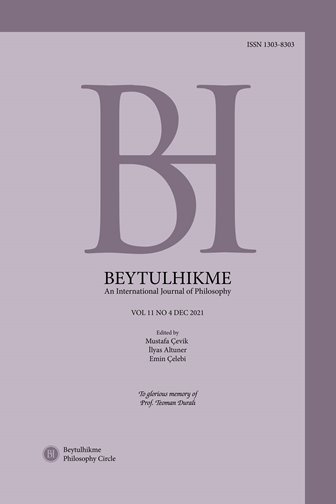Author :
Abstract
Simon Critchley, siyaseti etik bir uğrağı da olan dilsel bir yaratım meselesi olarak görür. Erdemli davranışın temeline duyguları yerleştiren düşünüre göre bu bağlamda acı ve öfke bütün insanlarda bulunan ortak duygulardır. Siyasi bir eylemin oluşturulması bakımından bu ortak doğayı önemli gören Critchley, adaletsizlik karşısında hissedilen bu duyguların yarattığı itici güç ile eyleme geçildiğini düşünür. Fakat bütünüyle öfke gibi kişinin kendisine ve çevresine zarar verme potansiyeli taşıyan bir duygudan hareket eden, siyasi bir dile sahip olmayan eylemin başarısız olacağına inanan düşünür, liberal kurumların ya da toplumsal grupların bu öfkeyi mizah yoluyla eyleme dönüştürmesi gerektiğini ileri sürer. Adaletsizlik, acı ve öfke gibi negatif duygulara merkezi bir rol veren bu duygu türlerini mizahi bir siyasi dil üzerinden toplumsal dayanışma aracı haline getirmek isteyen Critchley, buradan direniş siyasetine kapı aralamaktadır. Direniş, devletle çatlak kabilinden bir mesafe yaratmanın, bu mesafe sayesinde çeşitli kimliklerin tanınması ve bozulan adaletin yeniden tesis edilmesi gibi pek çok olumlu siyasi eylemi gerçekleştirmenin yolunu da açacaktır.
Keywords
Abstract
Simon Critchley considers politics as a matter of linguistic creation with an ethical aspect. In this context, pain and anger are common emotions found in all people according to the philosopher who placed emotions based on virtuous behavior. Considering this common nature as important in terms of creating a political action, Critchley thinks that people act with the driving force created by these feelings in the face of injustice. However, the philosopher believes that an action that is purely based on anger, which has the potential to harm oneself and the environment, and that does not have a political language, will fail and he argues that liberal institutions or social groups should turn this anger into action through humor. Critchley wants to make these types of emotions, which give a central role to negative emotions such as injustice, pain and anger, a tool of social solidarity with a humorous political language and from this point, he opens the door to the politics of resistance. Resistance will also pave the way for many positive political actions, such as the creation of an interstitial distance within the state, recognition of various identities by means of this distance, and re-establishing of the corrupted justice.
Keywords
- Badiou, A. (2009). On Simon Critchley's Infinitely Demanding: Ethics of Commit- ment, Politics of Resistance, Critical Horizons, 10:2, 154-162.
- Badiou, A. (2016a). Etik-Kötülük Kavrayışı Üzerine Bir Deneme. (Çev. Tuncay Birkan). Metis Yayınları: İstanbul.
- Badiou, A. (2016b). Sonsuz Düşünce. (Çev. Işık Ergüden & Tuncay Birkan). Metis Yayınları: İstanbul.
- Benhabib, S. (1999). Demokrasi ve Farklılık, Siyasal Düzenin Sınırlarının Tartışmaya Açılması. (Der. Seyla Benhabib). İstanbul: Demokrasi Kitaplığı, Dünya Yerel Yönetim ve Demokrasi Akademisi (WALD).
- Butler J. & Laclau & Zizek, S. (2000). Contingency, Hegemony, Universality Contempo- rary Dialogues on the Left. London: Verso.
- Butler, J. (2004). Precarious Life. London: Verso.
- Critchley, S. (2007). Infinitely Demanding, Ethics of commitment, politics of resistance. London: Verso.
- Critchley S. (2010). Sonsuz Talep, Bağlanma Etiği, Direniş Siyaseti. (Çev. Tuncay Bir- kan). Metis Yayınları: İstanbul.
- Critchley S. (2013). İmansızların İmanı, Sosyal Teoloji Deneyleri, (Çev. Erkal Ünal).
- Critchley, S. (2013). Introduction. The Anarchist Turn. (Ed. Jacob Blumenfeld, Chi- ara Bottici and Simon Critchley). New York: Pluto Press, 1-6.
- Critchley, S. (2020). Mizah Üzerine. (Çev. Seyran Sam). İstanbul: Monokl.
- Gramsci, A. (1986). Hapishane Defterleri. (Çev. Kenan Somer). İstanbul: Onur Ya- yınları.
- Gramsci, A. (2008). Hapishane Defterleri. (Çev. Kenan Somer). İstanbul: Aşina Ki- taplar.
- Gramsci, A. (2014). Modern Prens. (Çev. Kenan Somer). Ankara: Dipnot Yayınları.
- Gratton, P. (2007). Just Demanding, An Encounter with: Simon Critchley. Infini- tely Demanding: Ethics of Commitment, Politics of Resistance. PhaenEx 2, 2, 320-328.
- Habermas, J. (1999). Between Facts and Norms: Contributions to a Discourse Theory of Law and Democracy. (Trans. William Rehg). Cambridge: MIT Press.
- Ives, P. (2011). Gramsci’de Dil ve Hegemonya, (Çev. Ekrem Ekici). İstanbul: Kalkedon Yayınları.
- Kearney, R. (2012). Yabancılar, Tanrılar ve Canavarlar-Ötekiliği Yorumlamak. (Çev. Barış Özkul). Metis Yayınları: İstanbul.
- Laclau, E. (1980). New Reflections on the Revolution of Our Time. London: Verso.
- Macpherson, C. B. (1992). The Real World of Democracy. New York: Oxford Univer- sity Press.
- Mouffe, C. (1992). Dimensions of Radical Democracy. London: Verso.
- Mouffe, C. (2016). Yapıbozum, Pragmatizm ve Demokrasinin Siyaseti. Yapıbozum ve Pragmatizm. (Der. C. Mouffe). İstanbul: İletişim Yayınları, 7-25.
- Rorty, R. (2016). Simon Critchley’e Cevap. Yapıbozum ve Pragmatizm. (Der. C. Mo- uffe). İstanbul: İletişim Yayınları, 69-79.
- Thomas Peter, D. (2010). Gramsci Çağı Felsefe Hegemonya Marksizm, (Çev. İlker Ak- çay-Ekrem Ekici). Ankara: Dipnot Yayınları.
- Thomas, Peter D. (2013). Gramsci’de Diyalektik Hegemonya. (Çev. Rıdvan Caner). Gramsci-II, Felsefelogos. 48, 11-17.
- Thurschwell, A. (2007). Book Review: Infinitely Demanding: Ethics of Commitment, Po- litics of Resistance: By Simon Critchley. London: Verso.
- Infinitely Demanding Anarchism: An Interview with Simon Critchley. Son erişim Ocak 09, 2021.
